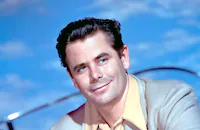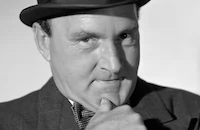Terror on a Train

Brief Synopsis
Cast & Crew
Ted Tetzlaff
Glenn Ford
Anne Vernon
Maurice Denham
Harcourt Williams
Victor Maddern
Film Details
Technical Specs

Synopsis
As a freight train loaded with explosives passes the depot in Birmingham, England, a man who was hiding onboard jumps off and, after fighting off a railway security officer, Constable Charles Baron, runs away. At the office of the railway police, Sgt. Collins examines the satchel the man left behind when he fled, and discovers wires and a box of detonators. Upon learning that the train contained sea mines headed for the naval shipyard at Portsmouth, Collins notifies zone security official Jim Warrilow, who immediately summons Sir Evelyn Jordan, the chief constable of Birmingham. The police search without success for the fugitive, and make plans to divert the train, out of fear that its cargo may be rigged to explode. On the theory that the saboteur may intend to witness the explosion, Baron is dispatched to Portsmouth to look for him. The police then decide to contact Major Peter Lyncort, a former member of the Royal Canadian Engineers' bomb disposal unit who now lives in Birmingham. Meanwhile, Peter is home with his French wife Janine, who complains that their marriage has grown dull since the end of the war. When Peter refuses to leave his job and accompany her to Paris, Janine sadly walks out. Meanwhile, the train is diverted to the town of Felsworth, where it is stopped and ordered to abandon its load. After the cars are disengaged and left on the tracks, the town's residents are evacuated. Warrilow goes to Peter's home and informs him of the sabotage, adding that the train was due to arrive in Portsmouth in less than eight hours. Peter accompanies Warrilow to Felsworth and, using an electric stethoscope, examines each mine on the train. Warrilow insists on helping with the search, and Peter reluctantly gives him a quick lesson in bomb detection. Meanwhile, Janine has second thoughts about leaving Peter, and a policeman at the train station tells her about the trouble down the line. After calling home and getting no reply, Janine waits for Peter at their favorite restaurant until closing time. As she prepares to leave, the proprietor tells her that news reports say someone is working to find and disarm the bomb. Janine returns home and grows melancholy when she finds Peter gone. As dawn breaks, Peter and Warrilow still have eleven cars to inspect in only two hours. Meanwhile, at the Portsmouth train station, Baron at last spots the saboteur and captures him. Janine grows worried and starts calling the hospitals, and learns that Peter came in the previous night to borrow an electric stethoscope. Finally realizing what Peter is doing, Janine drives to Felsworth in a panic. Meanwhile, Constable J. Reed brings Peter and Warrilow word that the saboteur has been caught and is being brought to Felsworth by naval helicopter. Warrilow finds a wire in one of the mines, and Peter orders him away while he examines it. Peter extracts a crude explosive device from inside the mine and nervously disarms it, then suggests to Warrilow that they not let the saboteur know that the bomb has been found. Janine arrives in Felsworth just as the police announce that the danger has been averted and people may return to their homes. Later, the saboteur is brought to the train, and Warrilow handcuffs him to one of the cars, saying he will be released when he provides information. The man grows increasingly nervous as time passes, and as seven o'clock approaches, cries out for help. Warrilow goes to question him, and is surprised to learn that the saboteur planted two charges in the same mine, and both are set to go off at seven. Warrilow quickly frees the man and informs Peter, who runs toward the train as the church clock begins to chime. Peter is reaching into the bomb when Janine runs up and refuses to leave his side. Peter removes the charge and hurls it from the train, and it explodes without igniting any of the mines. With their arms around each other, Peter and Janine walk away from the train.

Director

Ted Tetzlaff
Cast

Glenn Ford
Anne Vernon

Maurice Denham

Harcourt Williams

Victor Maddern

Harold Warrender
John Horsley
Campbell Singer

Bill Fraser
Herbert C. Walton
Martin Wyldeck
Arthur Hambling
Harry Locke
Frank Atkinson
Ernest Butcher
Crew
John Addison
Kem Bennett
Frank Clarke
Ralph Erwin
Richard Goldstone
Tom Howard
Joan Johnstone
Alfred Junge
Charles E. Parker
Royal Philharmonic Orchestra
A. W. Watkins
Robert Watts
F. A. Young

Videos
Movie Clip



Film Details
Technical Specs

Articles
Terror on a Train
For American viewers, Ford is likely to be the only recognizable name, although several cast members may be familiar. The British-set film (called Time Bomb for its U.K. release) features French actress Anne Vernon, who was in The Umbrellas of Cherbourg (1964) and Roberto Rossellini's General della Rovere (1959). Third-billed Maurice Denham began his film career in 1938 and worked for nearly 60 years in such films as Carol Reed's Our Man in Havana (1959) with Alec Guinness, The Nanny (1965) with Bette Davis, and the international productions Operation Crossbow (1965) and Those Magnificent Men in Their Flying Machines (1965). He was honored as an Officer of the British Empire (O.B.E.) in 1992.
Terror on a Train was the second movie Glenn Ford made with Ted Tetzlaff. Their first project was the mountain-climbing adventure The White Tower (1950). Although he directed more than a dozen films between 1941 and 1959, including the cult thriller The Window (1949), Tetzlaff's major career was as a cinematographer, responsible for more than 100 pictures over two decades beginning in 1926. After initial work as a lab assistant, he photographed several of Frank Capra's earliest films at Columbia, then moved on to Paramount, where he was behind the camera on a number of top-drawer productions, including My Man Godfrey (1936), Remember the Night (1940), and the second Hope-Crosby-Lamour teaming, Road to Zanzibar (1941). He was Oscar©-nominated for The Talk of the Town (1942) and worked with Alfred Hitchcock on Notorious (1946), his final film as a cinematographer.
One of the cinematographers on Terror on a Train was the legendary Freddie Young, whose career spanned from 1928 to 1985. Winner of numerous awards and honors for his work, Young is probably most closely associated with director David Lean, with whom he worked on Lawrence of Arabia (1962), Doctor Zhivago (1965), and Ryan's Daughter (1970). All three won him Academy Awards and top honors from the British Society of Cinematographers.
The year of Terror on a Train's release was an especially good one for Ford. He starred in four other movies in 1953, including one of his best, Fritz Lang's noir thriller The Big Heat. He quickly became one of the most popular actors of the 1950s and early 60s, with an ability to play drama, action and comedy with equal skill.
Director: Ted Tetzlaff
Producer: Richard Goldstone
Screenplay: Kem Bennett
Cinematography: Tom Howard, Freddie Young
Editing: Frank Clarke, Robert Watts
Original Music: John Addison, Ralph Erwin
Cast: Glenn Ford (Peter Lyncort), Anne Vernon (Janine Lyncort), Maurice Denham (Jim Warilow), Harcourt Williams (Vicar).
BW-73m. Closed captioning.
by Rob Nixon

Terror on a Train
Quotes
Trivia
Notes
The working titles of this film were Death at Attention and Time Bomb. The Variety review, published after the film's London release in February 1953, used the title Time Bomb. Terror on a Train was filmed on location in England.














